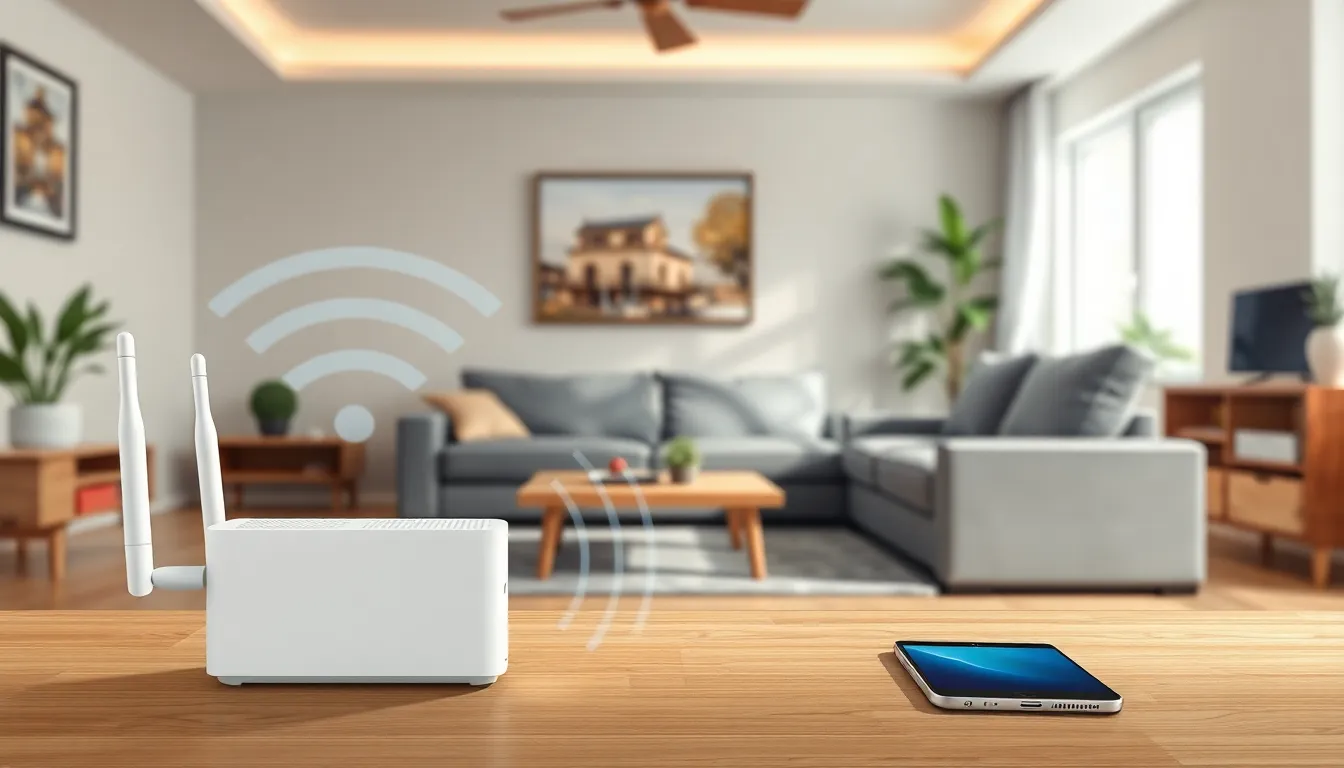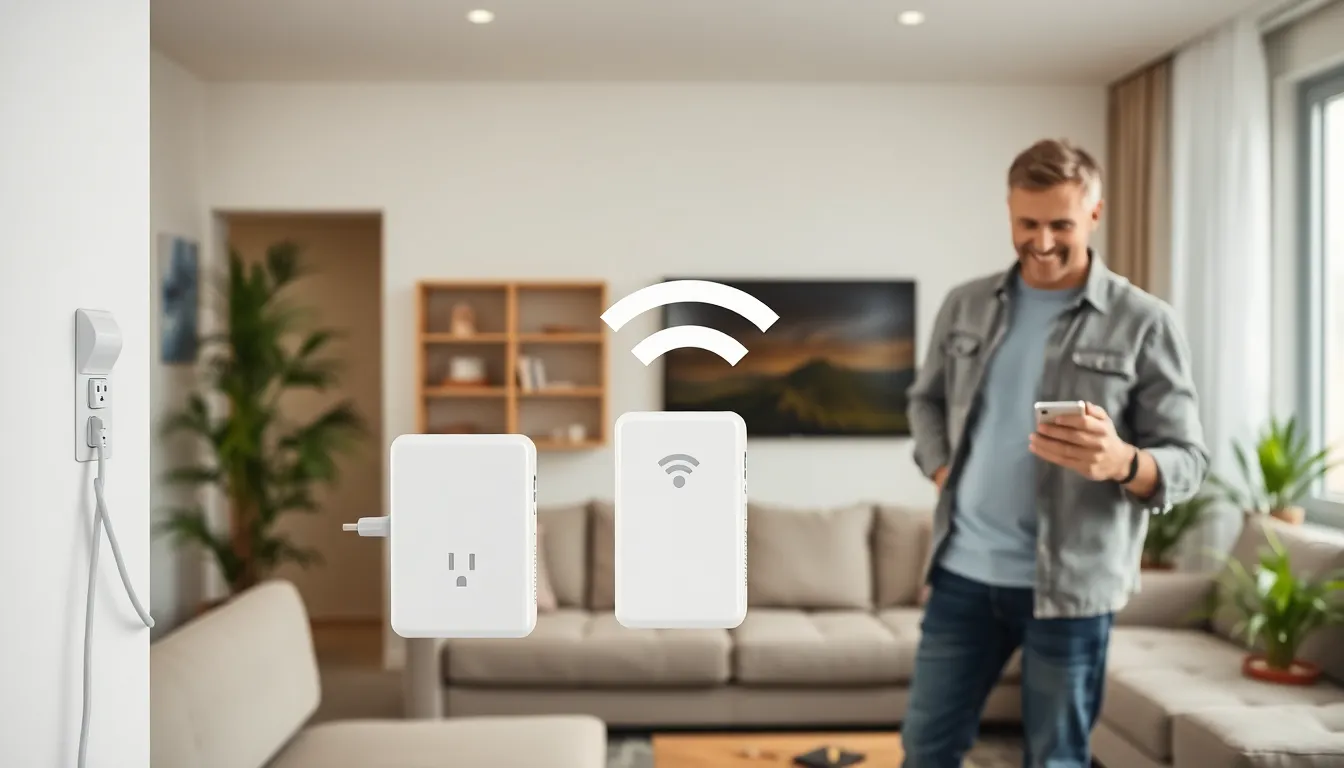In today’s fast-paced digital world, staying connected is more important than ever. Whether for work, streaming, or gaming, a strong and reliable internet connection can make all the difference. However, many people struggle with Wi-Fi dead zones in their homes or offices, making it difficult to maintain a seamless online experience.
This is where a network extender comes into play. By amplifying the existing signal, it bridges the gap between the router and those hard-to-reach areas. With the right network extender, users can enjoy uninterrupted connectivity, ensuring that every corner of their space is covered. Understanding how these devices work and their benefits can help anyone enhance their internet experience.
Table of Contents
ToggleWhat Is a Network Extender?
A network extender, often called a Wi-Fi extender or repeater, boosts existing wireless signals to eliminate dead zones. It receives the original signal from a router and amplifies it, distributing the enhanced signal throughout the environment. Network extenders improve internet connectivity in areas where the primary router’s signal is weak or obstructed.
Network extenders function by creating a new network, typically with a name similar to the original. They connect wirelessly to the router and extend its range, allowing devices farther from the router to maintain stable connections. Setting up a network extender usually involves placing it halfway between the router and the desired coverage area, ensuring optimal signal strength.
The devices work best in residential and commercial environments where large spaces or physical barriers, like walls or floors, impede signal strength. By implementing a network extender, users can experience uninterrupted streaming, gaming, and browsing activities, making it an essential tool for enhancing overall internet performance.
How Does a Network Extender Work?

Network extenders operate by capturing the original Wi-Fi signal from a router, amplifying it, and redistributing it to areas lacking coverage. This process effectively eliminates dead zones, ensuring a stronger and more reliable connection.
Types of Network Extenders
- Wi-Fi Repeater
Wi-Fi repeaters receive the router’s signal and rebroadcast it, improving coverage in specific areas.
- Powerline Adapter
Powerline adapters use existing electrical wiring to transmit the internet signal, bridging the gap between distant locations and the router.
- Mesh Wi-Fi System
Mesh systems consist of multiple nodes that work together to create a unified network, providing broader coverage across large spaces without dead zones.
- Wireless Range Extender
Wireless range extenders amplify wireless signals to reach farther areas, often set up in the middle of the coverage area.
Key Features to Consider
- Speed
Network extenders vary in speed. Users should select models that support their internet speed to maintain optimal performance.
- Compatibility
It’s essential to choose extenders compatible with the router’s frequency band, whether it operates on 2.4 GHz or 5 GHz, to ensure seamless connectivity.
- Ease of Setup
Extenders should offer user-friendly installation processes. Many models provide smartphone apps or simple interfaces for quick setup.
- Coverage Area
Different extenders provide varying coverage ranges. Selecting a model that matches the size of the target area enhances effectiveness.
- Security Features
Look for extenders equipped with robust security features to protect home networks from unauthorized access. Options like WPA3 encryption are recommended.
Benefits of Using a Network Extender
Network extenders offer numerous advantages that enhance internet connectivity.
- Improved Coverage: Network extenders eliminate Wi-Fi dead zones by boosting signals in hard-to-reach areas, ensuring consistent coverage throughout a home or office.
- Enhanced Speed: Users experience faster internet speeds in previously weak signal areas, enhancing streaming, gaming, and browsing activities.
- Cost-Effective Solution: Instead of investing in a new router, network extenders provide a budget-friendly option for improving Wi-Fi connectivity without extensive setup costs.
- User-Friendly Setup: Most network extenders feature simple installation processes, allowing users to set up devices quickly and easily without technical expertise.
- Increased Device Capacity: Network extenders support multiple devices simultaneously, allowing several users to enjoy stable internet access without slowing down the network.
- Flexible Placement: These devices can be adjusted to various locations based on coverage needs, accommodating different layouts and configurations.
- Seamless Streaming Experience: By enhancing connectivity in entertainment spaces, network extenders facilitate smooth video streaming and online gaming with minimal interruptions.
- Boosted Home Office Efficiency: For remote workers, improved internet reliability translates into efficient video conferencing and uninterrupted access to necessary online tools.
By implementing a network extender, users can significantly enhance the overall performance and reliability of their internet connections.
Common Use Cases for Network Extenders
Network extenders play a vital role in enhancing Wi-Fi connectivity across various environments. Here are the common scenarios where network extenders prove beneficial:
- Large Homes
Large homes often contain multiple floors and thick walls that impede Wi-Fi signals. Network extenders increase coverage in these expansive spaces, ensuring reliable connectivity in all rooms.
- Offices and Commercial Spaces
In offices, weak signal areas can disrupt productivity. Network extenders help maintain strong signals throughout larger commercial spaces, supporting seamless communication and internet access for employees.
- Outdoor Areas
Outdoor gatherings or activities can suffer from weak Wi-Fi signals. Network extenders boost connectivity to backyards or patios, enabling users to stream music, make video calls, or access the internet easily.
- Streaming and Gaming Zones
Dedicated streaming or gaming areas often require stable connections. Network extenders enhance internet speeds and reliability in these zones, providing uninterrupted experiences for users.
- Remote Workstations
Remote working often demands strong internet connections for video conferencing and online collaboration tools. Network extenders eliminate dead zones in home offices, facilitating smooth operations for remote professionals.
- Hotels and Guest Accommodations
Hotels often struggle with providing adequate Wi-Fi in every room. Network extenders improve guest experience by ensuring high-quality connections throughout the premises.
- Educational Institutions
Schools and universities frequently host many students who need reliable internet access. Network extenders enhance Wi-Fi coverage in classrooms, libraries, and common areas, supporting effective learning environments.
Implementing network extenders in these situations significantly enhances overall connectivity and leads to improved user satisfaction across various environments.
Investing in a network extender is a smart move for anyone facing Wi-Fi challenges. These devices effectively eliminate dead zones and enhance connectivity in both residential and commercial spaces. With their user-friendly setup and ability to support multiple devices, network extenders offer a practical solution for seamless internet access.
Whether it’s for streaming, gaming, or remote work, a network extender can significantly improve the online experience. By choosing the right model tailored to specific needs, users can enjoy reliable and robust internet coverage throughout their space. Embracing this technology leads to enhanced productivity and satisfaction in today’s digitally connected world.







